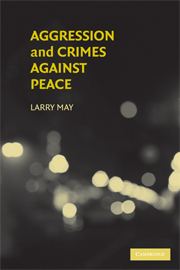Book contents
- Frontmatter
- Contents
- Acknowledgments
- PART A PACIFISM AND JUST WARS
- 1 Introduction: Between the Horrors and Necessity of War
- 2 Grotius and Contingent Pacifism
- 3 International Solidarity and the Duty to Aid
- PART B RETHINKING THE NORMATIVE AD BELLUM PRINCIPLES
- PART C THE PRECEDENT OF NUREMBERG
- PART D CONCEPTUALIZING THE CRIME OF AGGRESSION
- PART E HARD CASES AND CONCLUDING THOUGHTS
- Bibliography
- Index
3 - International Solidarity and the Duty to Aid
Published online by Cambridge University Press: 13 November 2009
- Frontmatter
- Contents
- Acknowledgments
- PART A PACIFISM AND JUST WARS
- 1 Introduction: Between the Horrors and Necessity of War
- 2 Grotius and Contingent Pacifism
- 3 International Solidarity and the Duty to Aid
- PART B RETHINKING THE NORMATIVE AD BELLUM PRINCIPLES
- PART C THE PRECEDENT OF NUREMBERG
- PART D CONCEPTUALIZING THE CRIME OF AGGRESSION
- PART E HARD CASES AND CONCLUDING THOUGHTS
- Bibliography
- Index
Summary
There exists a solidarity among men as human beings that makes each co-responsible for every wrong and every injustice in the world, especially for crimes committed in his presence or with his knowledge.
Karl JaspersIn the 17th century Grotius argued that States exist in a loose community, but there may be enough of an international community to generate duties of mutual aid. In the 18th century Vattel argued that States clearly owe each other assistance because they are all part of a larger community of States. Today, we also speak of an international community, as when it is said that crimes against peace or crimes against humanity harm the international community. In those historical and contemporary cases, theorists have sometimes tried to defend such claims by reference to the idea of solidarity among States. I will argue that solidarity is importantly associated with minimal duties of mutual aid within that community. But solidarity has too many conceptual and normative problems to be a strong grounding for such duties. Nonetheless I employ the idea of solidarity to defend a minimal duty of mutual aid of States that is able to justify some wars, although not as robust a duty as many human rights theorists seem to want today.
The duty of mutual aid of States is the counterpoint to the general prohibition on war that pacifists and even Just War theorists have defended over the centuries.
- Type
- Chapter
- Information
- Aggression and Crimes Against Peace , pp. 46 - 70Publisher: Cambridge University PressPrint publication year: 2008



